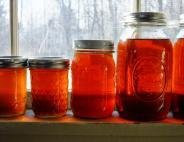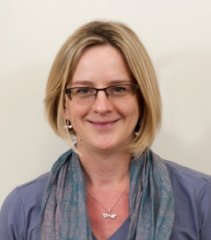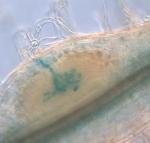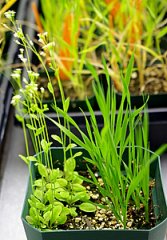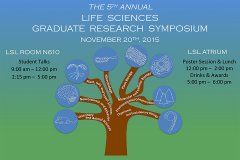News Highlights
As maple sugaring season approaches, plant ecologist Kristina Stinson recently received a two-year, $149,800 grant to study the impact of climate change on the quantity and quality of sugar maple sap, including its chemical composition, and of sap from red maples, a species less sensitive to climate change.
Rosie Cowell receives NSF CAREER award
Rosie Cowell receives NSF CAREER award
This 5-year award, "Testing a unified theory of perception and memory in the medial temporal lobe," for approximately $600,000 will allow Professor Cowell to develop and test a theory of how memory interacts with high-level visual perception and why both of these cognitive functions depend upon the medial temporal lobes. By applying the theory to both amnesia caused by brain damage and the more moderate memory loss caused by normal aging, this project will investigate whether these two forms of memory loss can be expained by the same mechanisms. This research will employ studies of memory performance, functional magnetic resonance imaging (fMRI), and computational modeling.
UMass Amherst Researchers Identify a Key Molecule in Nitrogen-Fixing Bacteria
UMass Amherst Researchers Identify a Key Molecule in Nitrogen-Fixing Bacteria
Researcher Dong Wang (Department of Biochemistry and Molecular Biology), along with postdoctoral researcher and lead author Minsoo Kim and former undergraduate student Chris Waters and colleagues at the Noble Foundation in Oklahoma, report in the early online edition of Proceedings of the National Academy of Sciences their discovery of a peptide found in alfalfa that holds the potential to improve crop yields without increasing fertilizer use. This peptide, DNF4 (also known as NCR211), is a “double agent,” having the ability to support nitrogen-fixing bacteria present inside the plant, while also killing free-living bacteria outside. Wang’s comments about his research in this area: “Next we want to find out why this peptide helps the bacteria inside the plant, but it can kill free-living bacteria outside the plant. Why does one molecule function as a double agent?” Read More
Gerald Downes receives grant to study how brain regulates locomotion
Gerald Downes receives grant to study how brain regulates locomotion
Neurobiologist Gerald Downes, with chemist James Chambers at the University of Massachusetts Amherst and Amherst College neurobiologist Josef Trapani, have been awarded a three-year $824,025 collaborative research grant from the National Science Foundation to study the zebrafish brain to better understand how neurons regulate locomotion. Downes, the lead investigator, says his ultimate research goal is to better understand how different chemical signals, called neurotransmitters, work together at cellular and molecular levels to coordinate normal locomotion such as walking and swimming. Read more
MCB Students Receive Fellowships
MCB Students Receive Fellowships
Safia Omer, 4th year student in Wei-Lih Lee’s lab in the Biology Department and Cameron Butova, 2nd year student in Scott Garman’s lab in the Biochemistry and Molecular Biology Department have both been awarded fellowships from the Biotech Training Program (BTP) for the following two years. The BTP training program is newly established through a T23 grant. Students granted this fellowship will complete BTP curriculum, complete an Individual Development Plan (IDP) with the Office of Professional Development, and pursue an Industrial Internship in addition to ongoing research in their labs.
Peterson's collections-based research gaining attention
Peterson's collections-based research gaining attention
Daniel Peterson's recent Evolution paper "Phylogenetic analysis reveals positive correlations between adaptations to diverse hosts in a group of pathogen-like herbivores" is discussed under "Research highlights" in the current issue of Evolutionary Applications. Peterson is an OEB PhD candidate in the Normark lab.
Li-Jun Ma named a Burroughs Wellcome Fund Investigator
Li-Jun Ma named a Burroughs Wellcome Fund Investigator
Li-Jun Ma, a University of Massachusetts Amherst biochemist and genomics expert, has received a coveted five-year, $500,000 Burroughs Wellcome Fund Investigator in the Pathogenesis of Infectious Disease award to develop new treatment options for opportunistic fungal infections. The Ma lab studies the genetic mechanisms that underlie the aggressive pathogenicity and genome evolution at the fungus-human interface in the model fungus Fusarium oxysporum. Ma and her colleagues will combine experimental and computational approaches to investigate pathogen virulence and host defense at the same time. Because of the huge amounts of data involved, she says, this project will use the advanced computing capabilities at the Massachusetts Green High Performance Computing Center in Holyoke. Read the full UMass News article here.
Hazen and Harrington receive two grants to develop crop biotechnology venture
Hazen and Harrington receive two grants to develop crop biotechnology venture
Plant growth is in part determined by a network of genes that influence total biomass yield. By studying the regulatory mechanisms of how plants build themselves, the Hazen Laboratory has identified ways to potentially boost energy crop yield. Professor Samuel Hazen and Postdoctoral Fellow Michael J. Harrington have been awarded grants from the National Science Foundation and the Massachusetts Clean Energy Center (MassCEC). The NSF Innovation Corp program award of $50,000 is designed to extend the basic laboratory research to entrepreneurial ventures. By participating in this program they will explore product opportunities and a business development plan. The MassCEC provided a $40,000 catalyst award to test what they have learned in their laboratory model, the small grass Brachypodium distachyon, in energy crop species.
Hazen selected as 2015 Whiting Fellow
Hazen selected as 2015 Whiting Fellow
Samuel Hazen, Biology, has received a grant from the Marion and Jasper Whiting Foundation. The award will support sabbatical research in France next year, on using phenomics as a teaching and research tool to understand how energy crops grow.
5th Annual Life Sciences Graduate Research Symposium: Nov 20
5th Annual Life Sciences Graduate Research Symposium: Nov 20
The 5th Annual Life Sciences Graduate Research Symposium will be held Friday, November 20th in Life Science Laboratory (LSL) 610. This event, organized for grad students by grad students, will feature talks by members of Organismic and Evolutionary Biology, Neuroscience and Behavior, Molecular and Cellular Biology, Microbiology, Plant Biology, and Environmental Conservation. A poster session, which includes lunch, runs from 12:00 - 2:00 in the LSL Atrium. Learn about the amazing life science research being conducted by UMass graduate students! Check HERE for more information.
